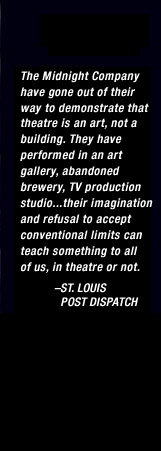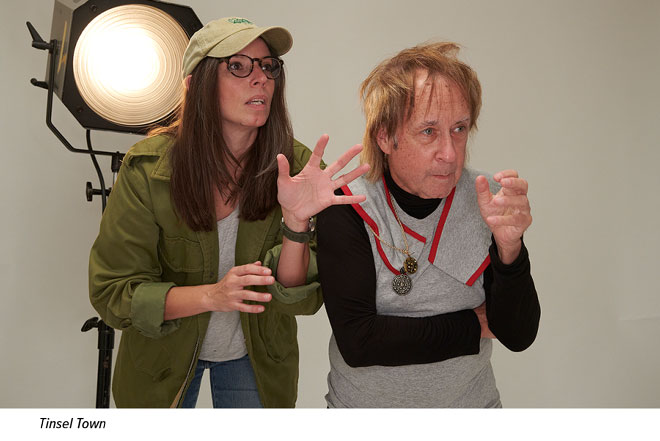
THE ORIGIN STORY
Joe Hanrahan first worked with Rachel Tibbetts when he recruited her to direct an earlier Midnight run of SEX DRUGS ROCK & ROLL, after seeing her direction of BACHELORETTE for her home company, SATE. Thus began an association between their two companies, with Hanrahan acting in ONE FLEA SPARE, OF MICE AND MEN, DOCTOR FAUSTUS and 2020’s APHRA BEHN FESTIVAL for SATE; and Ellie Schwetye of SATE directing JUDGMENT AT NUREMBERG (with Tibbetts in the cast), A MODEL FOR MATISSE and HERE LIES HENRY for Midnight.
But it was during the winter of 2016/2017 that these three did two plays together that demanded a third to complete a triptych sometime in the future. At that time, Hanrahan directed Schwetye and Tibbetts in the vampire drama, CUDDLES, for SATE, followed a month later with Schwetye directing Tibbetts and Hanrahan in Midnight’s Irish thriller, LITTLE THING BIG THING. So a third show was needed to complete the triptych, with Schwetye and Hanrahan acting, TIbbetts directing. Many scripts were explored over the past few years. A book they admired was looked at and worked on for adaptation. But during the lockdown, Hanrahan felt he had no excuse, so he started to write one. Which turned into 3. And so the third collaboration between the 3 was on!
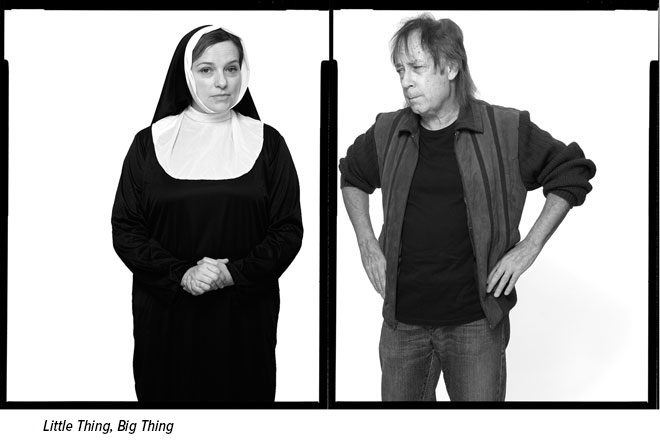
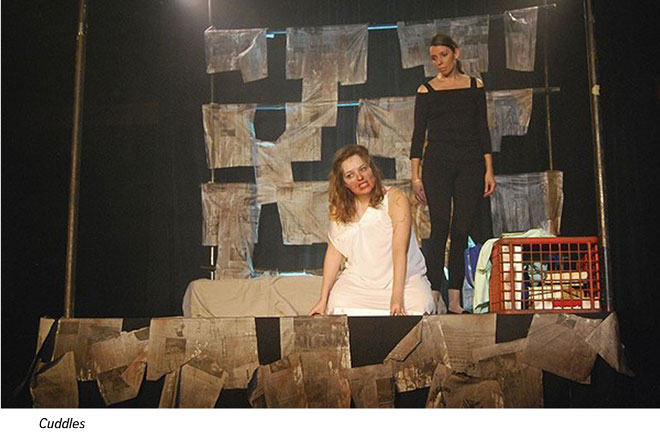
THE BACK STORY
Why Hollywood? Why three short plays about the entertainment business in Los Angeles? This might seem like sacrilege to fervent fans of the Fab Four, his solo music ranks very closely to his bandmates solo efforts in its quality and variety.
First, practical reasons. After searching widely with little luck for appropriate two-character (1 man 1 woman) plays that we liked (for the origin story of this endeavor, check previous Midnight FB posts), I started to write one - (during the pandemic lockdown, when one seemed to have all the time in the world) - one which turned out to be SHOOT IN SANTA MONICA. Set on the soundstage of a new science fiction movie, the actor was is one of those middle-aged European actors, usually stage veterans, who’ve come over the pond to take on leading character roles in Hollywood films - guys like Alan Rickman, Christoph Waltz and Mark Rylance. While the director is one of the many younger women who are currently directing Hollywood movies.
And this established the template for what would follow: plays where a man and a woman were working (or just meeting, then working) together, exploring the dynamics of the business they were in, and the challenges of collaborating on creative work, or creative careers. I then moved to a cliched Hollywood moment - the movie star and agent meeting (for LATE LUNCH ON MELROSE) and then segued into the music biz, with a still relevant singer/songwriter and a down-and-out old session musician running into each other in an alley behind a rock club in JUST OFF SUNSET. In each case, the setting (and the business) enabled me to write scenes where a man and woman could interact as professionals, without their gender influencing anything that happened. (Though power, as represented by the positions each had, was certainly a factor.)
SO, WHAT DO YOU KNOW ABOUT HOLLYWOOD?
Like many of us, I grew up on movies. TV, too, but movies were where the magic was. I grew up on stories - books as well as film. But not theatre. Our family was not in that demographic. I finally (very unsuccessfully) took a shot at theatre, since that was the closest thing around to getting a story in front of an audience. After an audition rejection, I vowed “No More Theatre,” but was lured back into it, and it’s been my convenient vehicle for story telling ever since. But my fascination with movies continued, and was now joined by an equal fascination at the behind-the-scenes drama that goes into movie-making. I devoured books and business news about deal-making, casting, set problems, studio machinations and more. And found it usually no less entertaining than the pictures these gyrations produced.
Also, as an ad exec at Ralston Purina, I was able to travel often to L.A., usually for production of radio or television. Crews intermingle between commercials and features there, and I picked up a lot of stories. And then I grabbed a small part of the Purina business to oversee - product placement - a somewhat sleazy underbelly of a basically sleazy business. This gave me early access to scripts, visits to sets and a few introductions to a few stars, experience dealing with mid-level studio execs, and more scuttlebutt from the set and prop design side of the endeavors.
And thus I was able to absorb some of the abject lessons that rule Hollywood - from the highest to the lowest levels.
And as an advertising writer/producer, I was fortunate to be able to work on some big budget commercials where I worked with some significant Hollywood production houses. Like George Lucasí Industrial Light And Magic - they were the keepers and operators of the Energizer Bunny. We finished those Bunny spots at Skywalker Ranch. And then for a few spots in London, worked with Ridley Scottís company. Ridley wasnít around, but his editor directed our commercials, and the crews had feature experience on a number of major films. And I hired David Dryer, who was Special Photographics Effects Supervisor on BLADE RUNNER, to direct an Eveready Flashlight spot. He turned that new, high tech device into a futuristic wonder.
As to credentials for the music biz play within TINSEL TOWN, I, like most of my contemporaries, was mired in rock ’n roll and the music and the musicians and the stories coming out of L.A. I suspect most of lucky to be around during that magic time can regale one with a multitude of legends and rumors from Laurel Canyon to Sunset Strip.
Finally, I turned to my son, Peter, to fact-check my script. Peter earned his Masters Degree in Playwriting under Lee Blessing at Rutgers, and one thing he learned is that thereís not a lot of money in playwriting. So he headed straight to L.A., where he got a job as a reader with United Talent Agency. He did that for a few years, made some contacts, and got a few of his own screenplays winding their way through the system. Heís back in St. Louis now, raising a family and teaching screenwriting at Webster, but he continues to be a long-distance reader for UTA and other production companies, and continues to push his scripts forward with the help of attached producers and directors.
And, with a few astute observations, he gave the scripts his official Reader OK, so overall I’m pretty confident with the background of the stories we’re telling in TINSEL TOWN.
BUT ONCE MORE, WHY HOLLYWOOD?
Why write and present plays about Hollywood? Thereís racism, sexism, climate crisis, the American political divide, you name it, plaguing us. Why waste your time on this?
Iíve always believed the early cultural analysis of the major impact of Hollywood in the early part of the 20th Century. That movies - which were a weekly habit of most of the population - helped teach us the way to behave, to make love, to do business, to dress, to live. When Clark Gable took his shirt off in IT HAPPENED ONE NIGHT and he wasnít wearing an undershirt, sales of that garment dropped 75% or so in the year that followed.
Hollywood certainly sustained its reach with the advent of television. And recently, even though the pandemic and viewing habits are threatening movies, with major sites streaming the many, many series weíre consuming and talking about, Hollywood, realize it or not, are smack dab in the center of our cultural lives.
Sure, thereís New York City, and London, and Paris, and many more - cities that enrich us via the arts and other cultural fashions, even though audiences are often somewhat local to those locations, and the arts that emanate from those great places often are viewed fairly narrow, if very cultured, segments of the population. But itís Hollywood - led by Disney, of course - and supported by the many franchises that have been embraced world-wide - that continues to have the most profound, most widespread cultural impact on the peoples of the world.
And so, thatís how I justify spending time on these three little tales from that show business megalopolis.
(And I must mention that this is not just a one man bang - Director Rachel Tibbetts has taken this project to heart, and helped set us in the historical, social and artistic realms of the phenomenon that is Los Angeles, with poems, selections from essays and videos of the place. And cast member Ellie Schwetye has been making regular, brilliant suggestions to the scripts, enriching and broadening them with sharp observations about the people whose stories weíre telling.)
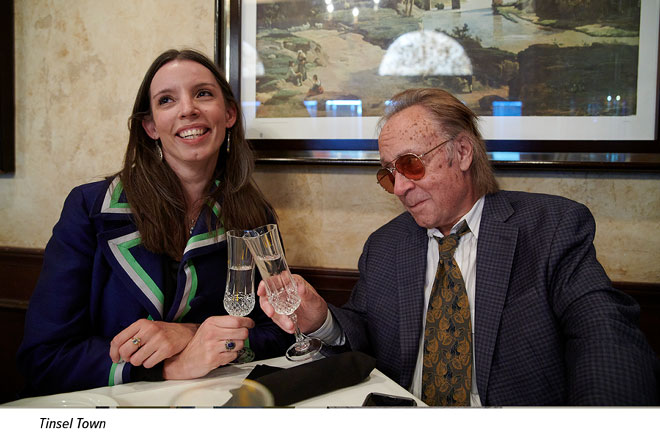
|

